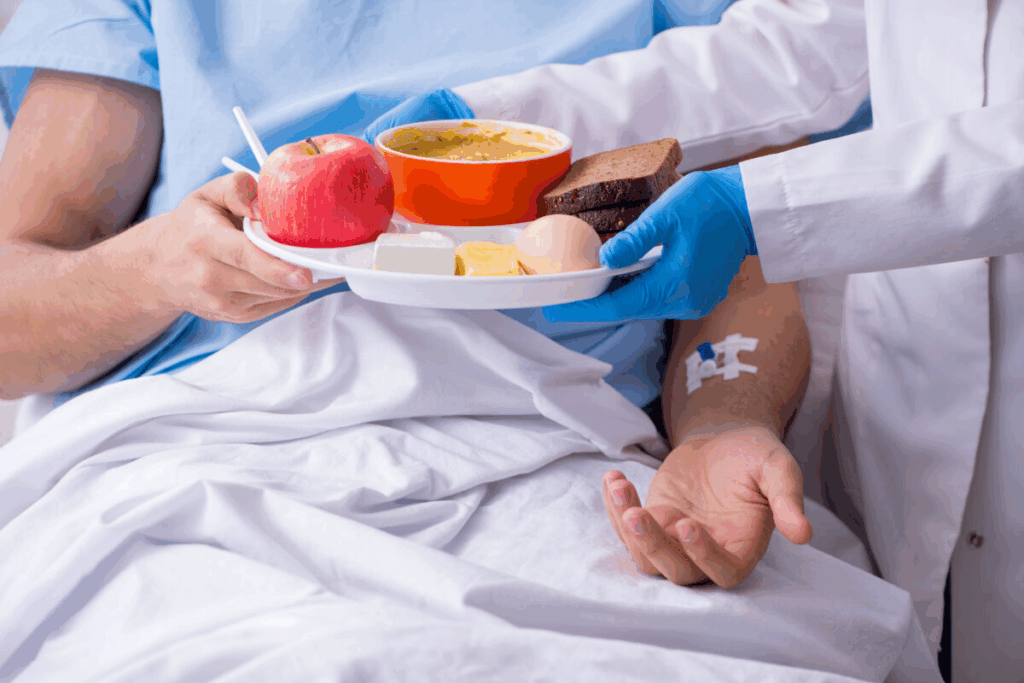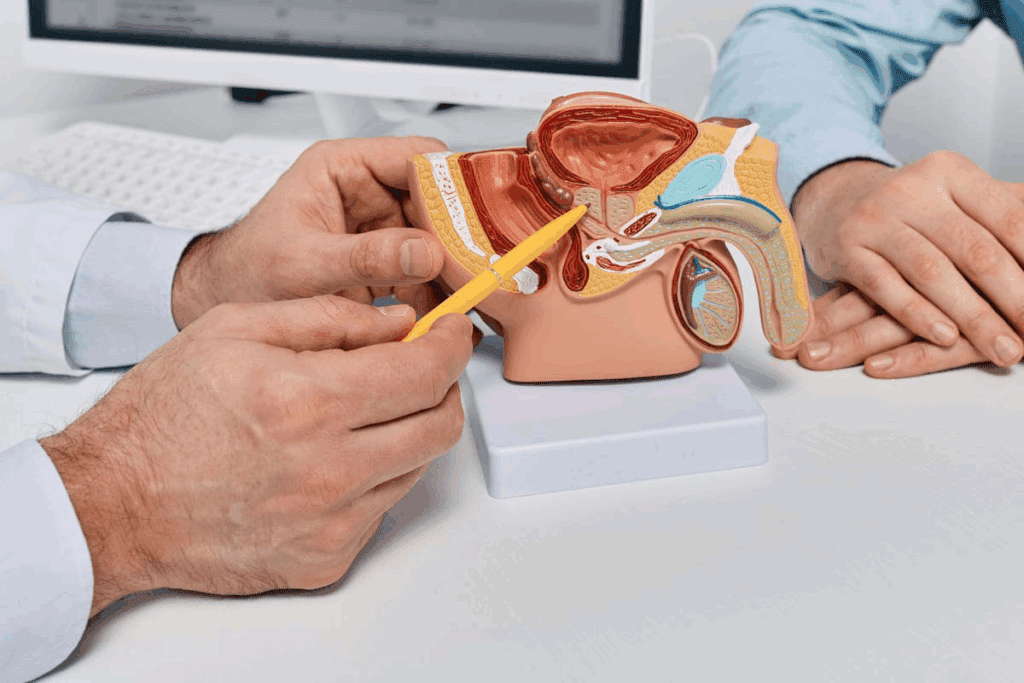
Did you know that many men over 50 face prostate issues? These problems can really affect their quality. Prostate health is a big concern, and what we eat is key to keeping it healthy.
Some foods can really help our prostate well-being. Research shows that certain foods can help our prostate health. This might even lower the chance of prostate problems.
We’re going to find out which foods for prostate health are the best. Knowing how our diet affects our prostate health helps us make better choices for our well-being.
Key Takeaways
- Diet plays a big role in keeping the prostate healthy.
- Some foods are great for prostate well-being.
- Eating right can help avoid prostate issues.
- Knowing what to eat can help men take care of their prostate.
- Some foods are better for prostate health than others.
The Connection Between Diet and Prostate Function

Diet plays a big role in prostate health. It affects how well the prostate works and how it feels. The prostate is key to a man’s reproductive system, and what we eat matters a lot.
The Prostate Gland: Structure and Function
The prostate gland is like a walnut and sits below the bladder in men. It wraps around the urethra and is important for making seminal fluid. This fluid helps sperm during ejaculation. Keeping the prostate healthy is vital for good urine flow and reproductive functions.
How Nutrition Affects Prostate Health
What we eat greatly affects our prostate health. Eating foods with the right nutrients helps keep the prostate working right. On the other hand, not eating enough of these nutrients can lead to problems.
Key nutrients for prostate health include:
- Zinc: Essential for prostate function and health
- Vitamin D: Plays a role in regulating cell growth and differentiation
- Antioxidants: Help protect cells from damage caused by free radicals
- Omega-3 fatty acids: Support overall health and may reduce inflammation
Eating foods full of these nutrients can help keep the prostate healthy. Next, we’ll look at specific foods that are good for the prostate.
Common Prostate Conditions Influenced by Diet
Diet is key in managing prostate health. What we eat can make symptoms better or worse. Knowing how diet affects the prostate is vital for making good food choices.
Benign Prostatic Hyperplasia (BPH)
BPH is when the prostate gets too big. This can cause trouble with urination. Studies show diet can affect how bad BPH gets.
Eating foods high in antioxidants, like fruits and veggies, might help. Foods with zinc, like pumpkin seeds, are also good for the prostate.
Prostatitis and Inflammation
Prostatitis is inflammation of the prostate. It can cause pain and trouble with urination. Diet can help manage this by reducing inflammation.
Foods like fatty fish, which are rich in omega-3s, are good. Avoiding spicy or acidic foods can also help. Adding anti-inflammatory foods to your diet can help manage prostatitis.
Prostate Cancer Risk Factors
Prostate cancer is common in men. Diet can affect the risk. Eating lots of fruits, veggies, and whole grains might help lower risk.
Foods like tomatoes, which are full of lycopene, are also good. The table below shows how diet affects prostate conditions:
| Prostate Condition | Dietary Influences | Beneficial Foods |
| Benign Prostatic Hyperplasia (BPH) | Antioxidants, Zinc | Fruits, Vegetables, Pumpkin Seeds |
| Prostatitis and Inflammation | Anti-inflammatory properties | Fatty Fish, Omega-3-rich foods |
| Prostate Cancer | Antioxidants, Lycopene | Tomatoes, Fruits, Vegetables |
In conclusion, diet is very important for prostate health. Making smart food choices can help keep the prostate healthy and lower the risk of problems.
Foods for Prostate Health: Scientific Evidence
Scientists have made big steps in figuring out how certain foods help the prostate. They found foods that fight inflammation, protect against damage, and balance hormones. These foods are key to keeping the prostate healthy.
Anti-inflammatory Mechanisms
Chronic inflammation can lead to prostate problems like prostatitis and cancer. Some foods have anti-inflammatory effects that can lower this risk. For example, omega-3 fatty acids in fatty fish like salmon and sardines help reduce prostate inflammation.
A study in the Journal of Nutrition showed omega-3 supplements can lessen inflammation and improve symptoms in men with prostatitis.
Turmeric, with its curcumin, is also anti-inflammatory. Curcumin stops inflammatory pathways, which might lower prostate inflammation and cancer risk. A study in Cancer Research found curcumin could be a strong tool against prostate cancer.
Antioxidant Protection
Antioxidants protect prostate cells from damage that can cause cancer. Foods high in antioxidants, like vitamins C and E, and polyphenols, help prostate health. Berries, for instance, are full of antioxidants and protect the prostate.
A study in the Journal of Agricultural and Food Chemistry showed pomegranate juice’s antioxidants slow prostate cancer growth. Pomegranates’ ellagic acid is thought to be behind this effect.
Hormonal Balancing Effects
Diet affects hormone levels, including DHT, which can cause prostate enlargement. Some foods may balance these hormones, lowering BPH risk. Foods like pumpkin seeds and oysters, rich in zinc, help regulate testosterone.
A study in the Journal of Clinical Endocrinology and Metabolism found zinc is key in managing testosterone and DHT levels. This is important for prostate health.
In summary, eating foods that fight inflammation, protect against damage, and balance hormones is good for the prostate. Men can lower their risk of prostate problems by eating these foods. This can help them stay healthy overall.
Tomatoes: The Number One Food for Prostate Health
Tomatoes are a top choice for a healthy prostate. They are full of lycopene, an antioxidant that boosts prostate health. Studies show that eating tomatoes can help keep the prostate in good shape.
Lycopene: The Powerful Prostate Protector
Lycopene gives tomatoes their red color. It’s a strong antioxidant and fights cancer, mainly in the prostate. Eating foods rich in lycopene can lower prostate cancer risk and slow disease growth.
Lycopene works by fighting free radicals, reducing inflammation, and stopping cancer cells from growing. So, eating foods high in lycopene is key to a healthy prostate.
Cooked vs. Raw: Maximizing Tomato Benefits
Cooked tomatoes are better for lycopene absorption than raw ones. Heat breaks down cell walls, making lycopene easier for the body to use. Both cooked and raw tomatoes are good, depending on how you eat them.
To get the most from tomatoes for prostate health, add different tomato products to your meals. Try fresh tomatoes, tomato sauce, and cooked tomato dishes. Here’s a comparison of lycopene in various tomato products:
| Tomato Product | Lycopene Content (mcg per 100g) |
| Raw Tomatoes | 2,570 |
| Tomato Sauce (cooked) | 18,330 |
| Canned Tomatoes | 9,270 |
Adding tomatoes to your diet is easy and tasty. Try them on sandwiches, in soups, or in salads. Eating tomatoes regularly helps support prostate health.
Foods That Shrink the Prostate Gland
The link between diet and prostate health is complex. Yet, some foods can help shrink the prostate gland. These foods contain nutrients that reduce inflammation and block DHT, a hormone linked to prostate growth.
Natural DHT Blockers in Food
DHT is a strong form of testosterone that can cause prostate enlargement. Foods with natural DHT blockers may help. Here are some examples:
- Green tea: It’s full of catechins, which might block DHT production.
- Pumpkin seeds: They’re rich in zinc, which is good for prostate health.
- Fatty fish: These have omega-3 fatty acids that can lower inflammation.
Anti-Inflammatory Foods for Prostate Size Reduction
Chronic inflammation can make the prostate bigger. Eating anti-inflammatory foods can help. Here are some good choices:
- Turmeric: It has curcumin, a strong anti-inflammatory.
- Berries: They’re full of antioxidants that fight oxidative stress.
- Leafy greens: These are packed with vitamins and minerals for health.
Eating these foods might help manage prostate size and improve health. It’s key to eat a balanced diet. Always talk to a healthcare expert for advice tailored to you.
Cruciferous Vegetables and Prostate Protection
Broccoli, cauliflower, and kale are more than just healthy foods. They are key to a healthy prostate. These cruciferous vegetables are full of vitamins, minerals, and special compounds. These help keep the prostate in good shape.
Broccoli, Cauliflower, and Kale Benefits
These veggies are full of nutrients that fight prostate problems. Broccoli is packed with vitamin C and fiber. Cauliflower has vitamin K and antioxidants. Kale is loaded with vitamins A, C, and K, plus calcium and iron.
- Rich in antioxidants and vitamins
- Contains fiber, which supports digestive health
- Packed with minerals essential for overall health
Sulforaphane: The Cancer-Fighting Compound
Sulforaphane is a key compound in these veggies. It has been studied for its anti-cancer effects. Sulforaphane is made when you chop or chew the veggies. This releases enzymes that turn it into its active form.
| Vegetable | Sulforaphane Content | Potential Benefits |
| Broccoli | High | Anti-cancer properties, antioxidant effects |
| Cauliflower | Moderate | Supports detoxification, anti-inflammatory effects |
| Kale | Moderate | Rich in antioxidants, supports overall health |
Adding these veggies to your meals is easy and tasty. Try them in salads, soups, or stir-fries. This way, you can help keep your prostate healthy.
Berries and Fruits for Prostate Wellness
Berries and fruits are great for prostate health. They are full of vitamins, minerals, and antioxidants. These nutrients help keep your body healthy, including your prostate.
Strawberries, Blackberries, and Blueberries
Strawberries, blackberries, and blueberries are good for your prostate. They have lots of antioxidants and anti-inflammatory compounds. Strawberries have vitamin C and ellagic acid, which fight cancer. Blackberries have anthocyanins, which protect cells. Blueberries are full of antioxidants and are good for your heart and prostate.
You can easily add these berries to your diet. Try them in cereal, smoothies, or as a snack. Eating them often is key to getting their benefits.
Pomegranates and Citrus Fruits
Pomegranates are good for your prostate. They have punicalagins, which fight inflammation and cancer. Drinking pomegranate juice may slow prostate cancer growth.
Citrus fruits like oranges and grapefruits are also good. They have vitamin C and flavonoids, which are antioxidants. These fruits boost your immune system and overall health, helping your prostate.
“A diet rich in fruits and vegetables, including berries and citrus fruits, is associated with a reduced risk of prostate cancer and other prostate-related issues.”
To get the most from these fruits, eat them as part of a balanced diet. Add sliced citrus fruits to salads or drink fresh juice. This way, you support your prostate and overall health.
By eating these fruits regularly, you help your prostate and overall health. It’s a smart way to stay healthy.
Nuts, Seeds, and Legumes for Prostate Support
Nuts, seeds, and legumes are packed with nutrients that help the prostate. They are full of zinc, selenium, and healthy fats. These are key to keeping the prostate healthy.
Pumpkin Seeds and Zinc
Pumpkin seeds are a great source of zinc. Zinc is important for the prostate. Not having enough zinc can lead to prostate problems like BPH and cancer. Eating pumpkin seeds helps keep zinc levels right, which is good for the prostate.
Nutritional Benefits of Pumpkin Seeds:
- High in zinc, supporting immune function and prostate health
- Rich in antioxidants, reducing oxidative stress
- Good source of healthy fats, supporting heart health
Walnuts, Brazil Nuts, and Selenium
Walnuts and Brazil nuts are full of selenium. Selenium fights off prostate cancer by reducing stress and inflammation. Adding these nuts to your diet is a tasty way to help your prostate.
| Nut | Selenium Content (mcg per ounce) | Prostate Health Benefits |
| Brazil Nuts | 544 | High selenium content supports antioxidant defenses |
| Walnuts | 4.9 | Rich in omega-3 fatty acids, which reduces inflammation |
Peanut Butter and Prostate Health
Peanut butter, made from peanuts, is good for the prostate. It has healthy fats and antioxidants like vitamin E. Vitamin E may lower the risk of prostate cancer. But, eat peanut butter in small amounts because it’s high in calories.
The Benefits of Moderate Peanut Butter Consumption:
- Rich in vitamin E, supporting antioxidant defenses
- Good source of healthy fats, supporting heart health
- Can be part of a balanced diet when consumed in moderation
In summary, nuts, seeds, and legumes are great for prostate health. Adding them to your diet can help lower the risk of prostate problems. They are full of nutrients that support a healthy prostate.
Omega-3 Rich Foods for Reducing Prostate Inflammation
Omega-3-rich foods are key to a healthy prostate. They help reduce inflammation in the body. This is good for your prostate health.
Cold-Water Fish Benefits
Cold-water fish are full of omega-3 fatty acids. Salmon, mackerel, and sardines are tasty and good for your prostate. Eating cold-water fish twice a week can help reduce prostate inflammation.
A study in the Journal of Nutrition showed that omega-3s from fish lower prostate cancer risk. Omega-3s’ anti-inflammatory effects help with prostatitis and other prostate issues.
“The evidence suggests that omega-3 fatty acids may have a protective effect against prostate cancer, though more research is needed to fully understand this relationship.”
Plant-Based Omega-3 Sources
If you follow a plant-based diet, there are good options for omega-3s. Chia seeds, flaxseeds, and walnuts are rich in ALA, a type of omega-3. ALA is not as effective as EPA and DHA, but it is beneficial for health.
| Food | Omega-3 Content (per serving) |
| Chia Seeds (1 oz) | 4915 mg |
| Flaxseeds (1 oz) | 6388 mg |
| Walnuts (1 oz) | 2542 mg |
Adding chia seeds to your breakfast or eating walnuts can boost your omega-3 intake. It’s important to be consistent and varied to support prostate health.
In summary, both cold-water fish and plant-based omega-3s are vital for prostate health. Adding these foods to your diet can greatly support your prostate health.
Green Tea and Other Beneficial Beverages
Research is showing a link between what we drink and our prostate health. Some drinks might help keep our prostate healthy. Let’s look at the benefits of different beverages.
Catechins and Prostate Cancer Prevention
Green tea is full of catechins, which are antioxidants. Catechins, like EGCG, might stop prostate cancer from growing. They can slow down cancer cells and make them die.
Studies on green tea catechins are promising. They’ve shown good results in lab tests and animal studies. More human studies are needed, but green tea could be good for prostate health.
Coffee, Water, and Prostate Function
Other drinks might also help our prostate. Coffee, for example, might lower the risk of some prostate problems. But we don’t know exactly how it works.
Drinking water is also key to our health, including our prostate. Water helps remove toxins and keeps prostate cells healthy. Drinking enough water is good for everyone, not just prostate health.
| Beverage | Potential Benefits for Prostate Health |
| Green Tea | Rich in catechins, which may prevent prostate cancer cell growth. |
| Coffee | It may reduce the risk of developing prostate cancer. |
| Water | Essential for hydration and flushing out toxins. |
Adding these drinks to your daily routine can help your prostate. But remember, a balanced diet is important. Always talk to a doctor before making big changes to your diet.
Creating a Complete Diet Plan for Optimal Prostate Health
To keep your prostate healthy, you need a good diet plan. This plan should include foods that are good for your prostate. Eating right can really help your health.
Focus on whole foods like fruits, veggies, nuts, seeds, and lean proteins. These foods give you important nutrients and help fight inflammation. They support your prostate health.
Daily Meal Planning Examples
Planning your meals for prostate health is easy. Here’s what a day’s meals could look like:
- Breakfast: Oatmeal with berries and walnuts, and a glass of green tea.
- Lunch: Grilled chicken salad with mixed greens, cherry tomatoes, and citrus vinaigrette.
- Dinner: Baked salmon with roasted broccoli and quinoa.
- Snacks: Carrot sticks with hummus, apple slices with almond butter.
This plan includes foods full of antioxidants and omega-3s. These are great for your prostate.
Combining Foods for Enhanced Benefits
Some foods work better together for prostate health. For example, vitamin C foods like citrus fruits pair well with iron foods like lean meats. This helps your body absorb iron better.
Tomatoes and olive oil are another good combo. Olive oil helps your body get more lycopene from tomatoes. Lycopene is a strong antioxidant.
“The way we mix foods in a meal can really affect how nutritious they are.”
Here’s how to mix foods for better health:
| Food Combination | Benefit |
| Tomatoes + Olive Oil | Enhanced lycopene absorption |
| Citrus Fruits + Iron-rich Foods | Improved iron absorption |
| Green Tea + Vitamin C-rich Foods | Boosted antioxidant activity |
By following these tips, you can make a diet plan that’s great for your prostate health.
As we learn more about keeping our prostate healthy, it’s clear that diet is key. Making smart food choices and mixing them right can really help your prostate.
Foods to Avoid for Better Prostate Health
Keeping your prostate healthy means eating right and avoiding bad foods. A diet full of fruits, veggies, and whole grains is key. But some foods can harm your prostate or make problems worse.
Red Meat and Processed Foods
Studies show that eating red meat and processed foods might raise prostate cancer risks. Red meat cooked at high heat can have harmful compounds. These might hurt your prostate.
- Processed meats like sausages and bacon are high in saturated fats and sodium.
- High-temperature cooking methods can lead to the formation of harmful compounds.
Reducing red and processed meat can help your prostate. Choose lean proteins and cook them differently to lower risks.
Dairy Products and Calcium Concerns
Dairy products have been questioned for their prostate health effects. High calcium intake from dairy might raise prostate cancer risk in some studies.
| Dairy Product | Calcium Content (per serving) | Potential Impact on Prostate Health |
| Milk | 300 mg | High calcium intake may increase prostate cancer risk |
| Cheese | 200-400 mg | High consumption linked to possible prostate issues |
It’s wise to limit dairy and find calcium in leafy greens and plant-based milk. This can help keep your prostate healthy.
Alcohol, Caffeine, and Spicy Foods
Be careful with alcohol and caffeine, as they can irritate your bladder and prostate. While a little might not hurt, too much can cause discomfort and worsen prostate problems.
Spicy foods can also bother your prostate and bladder, causing discomfort. Pay attention to how these foods affect you to make better choices.
Knowing how these foods and drinks can affect your prostate health helps you make better choices. This supports your overall well-being.
Supplements vs. Whole Foods for Prostate Support
Nutrition plays a big role in keeping the prostate healthy. But the debate is on: are supplements or whole foods better?
When Supplements May Be Necessary
Supplements can help in some cases, like when you can’t get enough nutrients from food. For example, if you have a zinc deficiency, taking zinc supplements can help your prostate.
Key situations where supplements may be necessary include:
- Nutritional deficiencies
- Dietary restrictions
- Specific health conditions
But always talk to a doctor before starting any supplements.
The Superiority of Food-Based Nutrition
Whole foods are packed with vitamins, minerals, and antioxidants. They work together to keep the prostate healthy. Foods like tomatoes and salmon are great because they’re full of nutrients.
“The whole is greater than the sum of its parts” is true for nutrition. Whole foods offer more than supplements can.
“A well-balanced diet is the cornerstone of prostate health. Focusing on whole foods can significantly contribute to overall well-being.”
Lifestyle Factors That Enhance Foods for Prostate Health
Prostate health is shaped by what we eat and our lifestyle. Nutrition is key, but other habits matter too. They can boost or harm the benefits of a healthy diet for the prostate.
Exercise and Physical Activity
Exercise is vital for prostate health. Research shows it lowers the risk of prostate problems, including cancer. It keeps weight in check, fights inflammation, and boosts the immune system.
“Physical activity is not just about reducing the risk of prostate cancer; it’s also about improving survival rates,” says a recent study published in a leading health journal. We recommend at least 30 minutes of moderate-intensity exercise most days of the week.
Stress Management Techniques
Stress can harm prostate health. It can cause inflammation and worsen prostate conditions. So, it’s important to manage stress every day.
- Meditation and mindfulness practices
- Yoga and tai chi
- Deep breathing exercises
These methods help control stress and improve overall health.
Sleep Quality and Prostate Function
Good sleep is essential for prostate health. Bad sleep can lead to inflammation and increase prostate risks. Good sleep habits are key.
Tips for better sleep:
- Maintain a consistent sleep schedule
- Create a restful sleep environment
- Avoid caffeine and electronics before bedtime
By eating right and living well, men can improve their prostate health. This reduces the risk of prostate problems.
Real-World Success: Dietary Changes and Prostate Improvement
Research shows that certain foods can help keep the prostate healthy. What we eat plays a big role in prostate health.
Looking into how diet affects the prostate helps us understand nutrition’s role in wellness.
Clinical Research Findings
Studies have given us important insights into diet and prostate health. They show that some diets can lower the risk of prostate problems.
| Dietary Component | Effect on Prostate Health |
| Lycopene-rich foods (e.g., tomatoes) | Reduced risk of prostate cancer |
| Cruciferous vegetables (e.g., broccoli) | Potential anti-cancer properties |
| Omega-3 fatty acids (e.g., from fish) | Anti-inflammatory effects |
Key findings from clinical research: A diet full of fruits, veggies, and healthy fats can improve prostate health.
Personal Success Stories
Many people have seen big improvements in their prostate health by changing their diet. These stories show the power of nutrition.
For example, a man with early-stage prostate cancer started eating more fruits, veggies, and whole grains. He noticed big health improvements and lower PSA levels.
These stories stress the importance of diet in prostate health. By choosing the right foods, we can support our prostate’s well-being.
Conclusion: Implementing a Prostate-Healthy Diet for Life
We’ve looked at how diet affects prostate health. We found that certain foods can really help. Eating fruits, vegetables, and healthy fats is key to keeping your prostate healthy.
Adding tomatoes, cruciferous veggies, and omega-3 fish to your meals can make a big difference. It’s also important to cut down on red meat and processed foods. They can harm your prostate.
Starting a prostate-healthy diet is a big step towards better health. We urge you to make smart food choices today. Mix these foods in ways that boost their benefits and support your health.
FAQ
What are the best foods for prostate health?
Foods high in antioxidants, omega-3s, and nutrients like lycopene, zinc, and selenium are good. Tomatoes, cruciferous veggies, berries, nuts, and seeds are examples.
How does diet influence prostate health?
Diet is key to prostate health. What you eat can affect your risk of BPH, prostatitis, and prostate cancer. Eating fruits, veggies, whole grains, and healthy fats helps your prostate.
Are tomatoes really beneficial for prostate health?
Yes, tomatoes are great for prostate health. They’re full of lycopene, an antioxidant that fights cancer and supports the prostate.
Can certain foods shrink the prostate gland?
Some foods, like those with natural DHT blockers and anti-inflammatory compounds, might help manage prostate size. Foods rich in omega-3s, zinc, and antioxidants are good examples.
Are supplements or whole foods better for prostate support?
Whole foods are better for prostate support than supplements. They offer a mix of nutrients that work well together.
How can lifestyle factors enhance the benefits of prostate-healthy foods?
Lifestyle choices like exercise, managing stress, and getting enough sleep can boost the benefits of a healthy diet. They help support prostate health.
Are there foods that can worsen prostate health?
Yes, foods like red meat, processed foods, and dairy with high calcium can harm the prostate. Alcohol, caffeine, and spicy foods should also be limited.
Can dietary changes really improve prostate health?
Yes, changing your diet can improve prostate health. Studies and personal stories show that a healthy diet can reduce prostate cancer risks.
What are some examples of prostate-healthy meal planning?
Healthy meal planning includes foods like tomatoes, cruciferous veggies, berries, nuts, seeds, and omega-3s. Avoid foods that might harm the prostate.
Is peanut butter good for prostate health?
Peanut butter, in small amounts, is good for prostate health. It has healthy fats and antioxidants. Choose natural peanut butter without added sugars or hydrogenated oils.
How do omega-3-rich foods benefit prostate health?
Omega-3s in foods like cold-water fish and plants reduce prostate inflammation. This supports prostate health.
Can green tea benefit prostate health?
Yes, green tea’s catechins may have anti-cancer effects and support prostate health.
Reference:
Medical News Today. (2024). Enlarged prostate diet: Foods to eat and avoid.https://www.medicalnewstoday.com/articles/321079



































